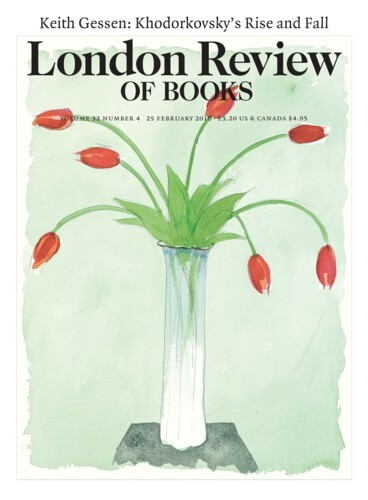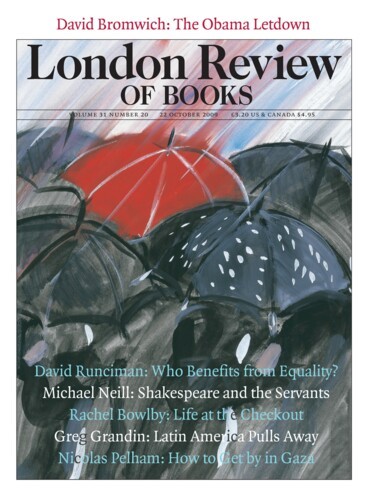The Australian (Labor) government has just published a white paper (‘Securing Australia – Protecting Our Community') which assures its readers that the terrorist threat to Australia is stronger than ever. External threats remain, of course, but are now made much worse by the dangers of homegrown terrorism, a result of the spread of jihadist propaganda among Australia’s Muslim population. The government is proposing to increase significantly the powers of the federal police – including the right to search the property of suspected ‘terrorists’ without a warrant – and to introduce further (and severe) visa tests on people coming to Australia from 10 unnamed countries. Sound familiar? It should, because the prime minister, Kevin Rudd, has acknowledged that in preparing the legislation the Australians consulted the British government. What lies behind all this?
Ross McKibbin
Ross McKibbin is an emeritus research fellow at St John’s College, Oxford.
Good for Business: The End of Research?
Ross McKibbin, 25 February 2010
In January last year a directive from John Denham, secretary of state in what was then the Department for Innovation, Universities and Skills, announced that research funding for universities was going to be rethought.* The new system should ‘continue to incentivise research excellence’ and reward ‘the quality of researchers’ contribution to public policy-making and to...
The BNP clearly hopes it has the wind in its sails. It has dispatched a newsletter to its supporters which, though it apologises for the lateness of the 2008 accounts (just completed), is intended to sound pretty self-confident. Indeed, one reason the letter gives for lateness is that the party has been overwhelmed by new members. (There is also a coy reference to ‘unresolved internal problems’ as factors which made life difficult, problems which have, we are to understand, now been resolved.) Party membership, it says, is now 13,000 and rising – with 3000 ‘on hold’ as a result (it does not quite say) of a ruling that the BNP was in breach of the law by imposing a racial bar on membership. There are two interesting features to this letter.
It is hard to know what to make of this week’s Question Time. Most of what happened was fairly predictable. Nick Griffin was a rhetorical mess and the other members of the panel (including David Dimbleby) had clearly come well-prepared with damning quotations and facts. If Griffin hoped to advance his cause – as he believed he could – then he failed. But it is questionable whether that matters. Most of his actual and potential supporters are unlikely to watch Question Time and few people who do watch it would be converted, however brilliantly he performed. The BNP draws such strength as it has (and it is not much) from grievances which are not met by arguments from the facts.
At the Tory Conference
Ross McKibbin, 22 October 2009
The most enthusiastic moment came when David Cameron promised to end poverty and pronounced the Tories the real party of the poor. The Conservatives have, of course, always thought themselves the real party of the poor but this time the claim was accompanied by some genuine rhetoric about inequality which they may come to regret. The party, to judge by what was said in the hall, has changed;...
Pieces about Ross McKibbin in the LRB
Blame Lloyd George: England 1914-51
W.G. Runciman, 27 May 2010
When Oxford University Press commissioned Ross McKibbin to write the volume in the New Oxford History of England covering the years 1918 to 1951, they got more than they bargained for. McKibbin...
Mister Sheppard to you: Classes and Cultures: England 1918-51 by Ross McKibbin
R.W. Johnson, 21 May 1998
Ross McKibbin’s remarkable study of the way the cultures of class shaped English society has, at a stroke, changed the historiographical landscape. One learns more about almost any aspect...
Ross McKibbin and the Rise of Labour
W.G. Runciman, 24 May 1990
In 1984, Ross McKibbin published an article in the English Historical Review called ‘Why was there no Marxism in Great Britain?’ His choice of title was a deliberate invocation of the...
Read anywhere with the London Review of Books app, available now from the App Store for Apple devices, Google Play for Android devices and Amazon for your Kindle Fire.
Sign up to our newsletter
For highlights from the latest issue, our archive and the blog, as well as news, events and exclusive promotions.



